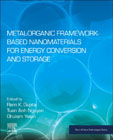
Metal-Organic Framework-Based Nanomaterials for Energy Conversion and Storage
Gupta, Ram K.
Nguyen, Tuan Anh
Yasin, Ghulam
Metal-Organic Framework-Based Nanomaterials for Energy Conversion and Storage addresses current challenges and covers design and fabrication approaches for nanomaterials based on metal organic frameworks for energy generation and storage technologies. The effect of synthetic diversity, functionalization, ways of improving conductivity and electronic transportation, tuning-in porosity to accommodate various types of electrolyte, and the criteria to achieve the appropriate pore size, shape and surface group of different metal sites and ligands are explored. The effect of integration of other elements, such as second metals or hetero-atomic doping in the system, to improve catalytic activity and durability, are also covered. This is an important reference source for materials scientists, engineers and energy scientists looking to further their understanding on how metal organic framework-based nanomaterials are being used to create more efficient energy conversion and storage systems. Describes major metal organic framework-based nanomaterials applications for fuel cell, battery, supercapacitor and photovoltaic applications Provides information on the various nanomaterial types used for creating the most efficient energy conversion and storage systems Assesses the major challenges of using nanotechnology to manufacture energy conversion and storage systems on an industrial scale INDICE: Part 1: Fundamentals 1. Introduction to MOFs 2. Design and construction of MOF nanomaterials 3. Materials and chemistry of MOFs 4. Strategies to enhance the electrochemical properties of MOFs Part 2: Metal-organic Frameworks for Fuel Cells 5. MOF-based electrocatalysts for oxygen evolution reactions 6. MOF-based electrocatalysts for hydrogen evolution reactions 7. MOF-based electrocatalysts for oxygen reduction reactions 8. MOF-based electrocatalysts for hydrogen reduction reactions Part 3: Metal-organic Frameworks for Batteries 9. MOF-based nanomaterials for metal-ion batteries 10. MOF-based nanomaterials for anodes 11. MOF-based nanomaterials for cathodes 12. MOF-based nanomaterials for metal-sulfur batteries 13. MOF-based electrolytes for battery applications Part 4: Metal-organic Frameworks for Supercapacitors 14. MOF-carbon nanocomposites for supercapacitors 15. MOF-metal oxides/sulfide/phosphide-based nanocomposites for supercapacitors 16. Other nanocomposites of MOFs for supercapacitors 17. Flexible supercapacitors based on nanocomposites of MOFs Part 5: Metal-organic Frameworks for Photovoltaics 18. MOF-based dye-sensitized photovoltaics 19. MOFs as electrolytes in photovoltaics 20. MOFs for perovskite photovoltaics 21. Flexible photovoltaics based on MOFs Part 6: Metal-organic Frameworks for Other Applications 22. MOFs for hydrogen storage 23. MOFs for methane storage 24. MOFs for heat pumps and storage Part 7: Challenges and Future 25. Recycling approaches for used energy devices 26. Challenges and future prospective of MOFs for energy applications
- ISBN: 978-0-323-91179-5
- Editorial: Elsevier
- Encuadernacion: Rústica
- Páginas: 884
- Fecha Publicación: 01/05/2022
- Nº Volúmenes: 1
- Idioma: Inglés
